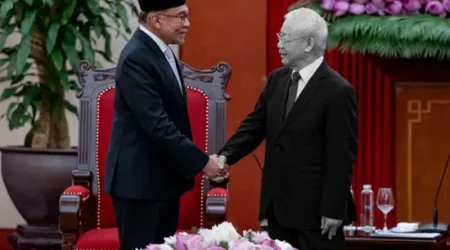Zahid’s visit to China to have positive impact on national TVET landscape
KUALA LUMPUR: Deputy Prime Minister Datuk Seri Dr Ahmad Zahid Hamidi’s official visit to China from May 22 to June 1 is expected to bring about a positive impact on the Technical and Vocational Education and Training (TVET) landscape in Malaysia.
National Association of Skilled Workers secretary-general Mohammad Rizan Hassan said this is because Ahmad Zahid who is also the Chairman of the National TVET Council is committed to sending local TVET talent to China through the Malaysia-China Institute, an initiative he announced last year, to enhance skills training.
Ahmad Zahid who is also the Rural and Regional Development Minister is now on his first official visit to China since assuming the position of Deputy Prime Minister in December 2022 and the visit was at the invitation of Chinese Vice Prime Minister Ding Xuexiang.
“The sending of local TVET talent to China is a short-term and long-term training programme through the Malaysia-China Youth TVET Training initiative. For the record, until May 2024, a total of 850 people are undergoing training at several Chinese TVET institutions in fields such as railway technology, robotics, artificial intelligence (AI), Internet of Things (IoT), electric vehicles (EV), animation multimedia, e-commerce and many more.
“In recent years, Malaysia and China have seen significant progress in various sectors, including economic, technological and cultural exchanges,” Mohammad Rizan said in a statement on Friday (May 24).
However, he said there is still potential for cooperation between Malaysia and China that has not been fully explored in the field of TVET, especially in addressing the growing demand for skilled workers in key industries such as manufacturing, engineering and technology.
“This cooperation not only benefits the economy of both countries but also contributes to regional prosperity and stability. One of the main advantages of increasing TVET cooperation between Malaysia and China is the exchange of knowledge and best practices.
“Both countries have unique expertise and experience in TVET and by sharing resources and learning from each other, Malaysia and China can improve the quality of education and training for their students,” he said, adding that it would also benefit students and industry in both countries.
In addition, Mohammad Rizan said an important aspect of Malaysia-China TVET cooperation is the potential to build a skilled workforce that meets the demands of the global market.
“By aligning TVET programmes with industry needs and trends, Malaysia and China can produce well-equipped graduates to meet the economic challenges of the 21st century, and this collaboration can also help bridge the skills gap and address the mismatch between job requirements and graduate qualifications,” he said.
On the economic benefits, Mohammad Rizan said Malaysia-China TVET cooperation can also strengthen people-to-people relations and foster cultural understanding between the two countries by exposing students to various perspectives, languages and traditions.
He said the cultural exchange could lead to lasting friendships and partnerships that cross borders and contribute to a more interconnected and peaceful world.
“To maximise the impact of Malaysia-China TVET cooperation, it is important for both countries to invest in infrastructure, resources and capacity building in technical and vocational education.
“This includes providing support for teacher training, curriculum development, and industry collaboration to ensure TVET programmes meet international standards and industry requirements,” he said. – Bernama













Leave a Reply